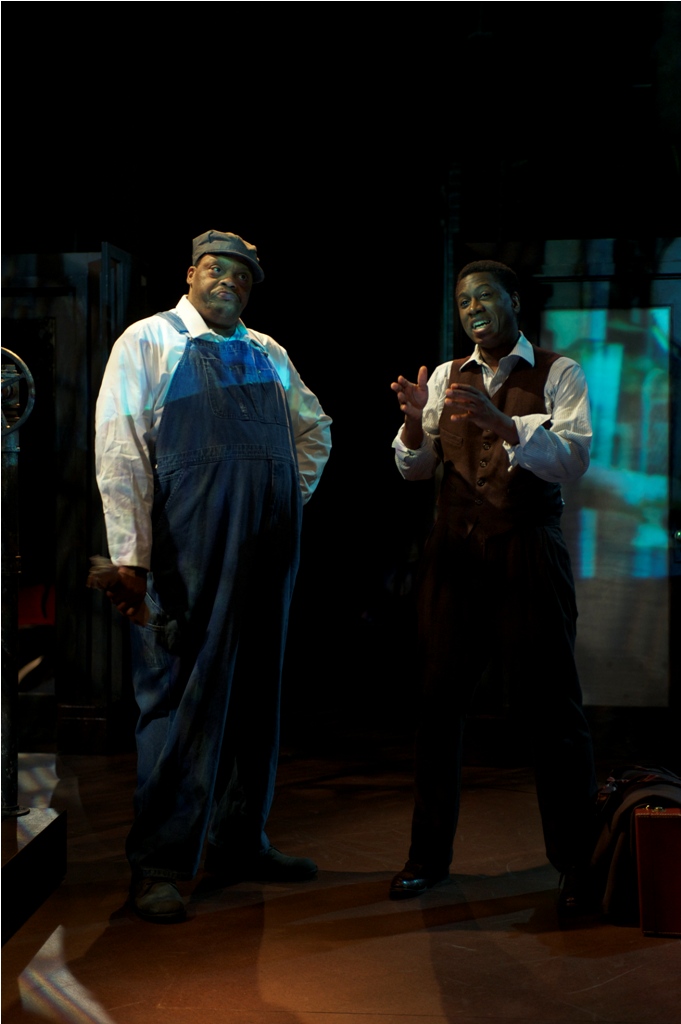Monday
Jan232012
Theater Review - Invisible Man
 Monday, January 23, 2012 at 7:03AM
Monday, January 23, 2012 at 7:03AM
Theater Review - Invisible Man
by C. Dixon Freeman
Creating a play from author Ralph Ellison’s Court 1952 classic Invisible Man—as Court Theatre has done--would seem as risky as sailors following the call of the Sirens. And yet what company wouldn’t be tempted?
 The book has strong central character in the unnamed black male protagonist who tells the reader a nightmarish coming of age story that doubles as a treatise on race in 20th century America. He is invisible, he learns — and we learn — because white people refuse to acknowledge him. But Ellison’s book substitutes straight narrative with time shifts, metaphor, humorous riffs, and episodic pieces and character soliloquies that are like the jazz music that inspired his writing. There’s a riot, a factory explosion and assorted other calamities. In the wrong hands, the play could have been diluted to assure a clearer storyline for the audience — or mishandled to the point of shipwreck.
The book has strong central character in the unnamed black male protagonist who tells the reader a nightmarish coming of age story that doubles as a treatise on race in 20th century America. He is invisible, he learns — and we learn — because white people refuse to acknowledge him. But Ellison’s book substitutes straight narrative with time shifts, metaphor, humorous riffs, and episodic pieces and character soliloquies that are like the jazz music that inspired his writing. There’s a riot, a factory explosion and assorted other calamities. In the wrong hands, the play could have been diluted to assure a clearer storyline for the audience — or mishandled to the point of shipwreck.
Fortunately, director Christopher McElroen steers clear of the rocks and sails nicely with Invisible Man, which made its world premiere last Saturday at Court Theatre. McElroen’s steady hand and Oren Jacoby’s well-done adaptation retains the power of Ellison’s landmark book — long thought to be unable to be staged — and more than a bit of its brilliance.
 Teagle F. Bougere is pitch perfect as the invisible man, the tale’s central character and narrator. Leading the 10-member cast, Bougere is a revelation, carrying the play on his shoulders as his character goes from adventure to misadventure, turning from a clueless Southern innocent, to a sly, worldly yet pained man who has learned to live — and ultimately take advantage of — the system that denies him.
Teagle F. Bougere is pitch perfect as the invisible man, the tale’s central character and narrator. Leading the 10-member cast, Bougere is a revelation, carrying the play on his shoulders as his character goes from adventure to misadventure, turning from a clueless Southern innocent, to a sly, worldly yet pained man who has learned to live — and ultimately take advantage of — the system that denies him.
 Lance Steward Baker is a standout, playing a variety of characters, and is particularly good as Brother Jack, leader of a Marxist group in Harlem. A.C. Smith’s as president of the black college is also of note. Chris Boykin has a poignant turn as the ill-fated Tod Clifton. And Troy Hourie’s set design and Alex Koch’s rear projection convincingly turn small stage to everything from a cramped New York City basement apartment to a Southern all-black college to the big streets of New York. A scene in which the protagonist faces a series of spinning closed doors as he looks for a job in Manhattan is simply inspired.
Lance Steward Baker is a standout, playing a variety of characters, and is particularly good as Brother Jack, leader of a Marxist group in Harlem. A.C. Smith’s as president of the black college is also of note. Chris Boykin has a poignant turn as the ill-fated Tod Clifton. And Troy Hourie’s set design and Alex Koch’s rear projection convincingly turn small stage to everything from a cramped New York City basement apartment to a Southern all-black college to the big streets of New York. A scene in which the protagonist faces a series of spinning closed doors as he looks for a job in Manhattan is simply inspired.
The play has a few rough edges to sand off. For a three hour play, the scene at the Golden Day restaurant and the aftermath rush by too quickly. Given the mishap there essentially sends his character on his journey, those scenes should have played out longer and deeper, as was the case in the book. And actor Paul Oakley Stovall should let loose and make Ras as fearsome as the character depicted in the book.
Still, Invisible Man is noteworthy piece of theater and is recommended.
____________________
Invisible Man continues at Court Theatre through February 19, 2012. All photos by Michael Brosilow.
by C. Dixon Freeman
Creating a play from author Ralph Ellison’s Court 1952 classic Invisible Man—as Court Theatre has done--would seem as risky as sailors following the call of the Sirens. And yet what company wouldn’t be tempted?
 The book has strong central character in the unnamed black male protagonist who tells the reader a nightmarish coming of age story that doubles as a treatise on race in 20th century America. He is invisible, he learns — and we learn — because white people refuse to acknowledge him. But Ellison’s book substitutes straight narrative with time shifts, metaphor, humorous riffs, and episodic pieces and character soliloquies that are like the jazz music that inspired his writing. There’s a riot, a factory explosion and assorted other calamities. In the wrong hands, the play could have been diluted to assure a clearer storyline for the audience — or mishandled to the point of shipwreck.
The book has strong central character in the unnamed black male protagonist who tells the reader a nightmarish coming of age story that doubles as a treatise on race in 20th century America. He is invisible, he learns — and we learn — because white people refuse to acknowledge him. But Ellison’s book substitutes straight narrative with time shifts, metaphor, humorous riffs, and episodic pieces and character soliloquies that are like the jazz music that inspired his writing. There’s a riot, a factory explosion and assorted other calamities. In the wrong hands, the play could have been diluted to assure a clearer storyline for the audience — or mishandled to the point of shipwreck.Fortunately, director Christopher McElroen steers clear of the rocks and sails nicely with Invisible Man, which made its world premiere last Saturday at Court Theatre. McElroen’s steady hand and Oren Jacoby’s well-done adaptation retains the power of Ellison’s landmark book — long thought to be unable to be staged — and more than a bit of its brilliance.
 Teagle F. Bougere is pitch perfect as the invisible man, the tale’s central character and narrator. Leading the 10-member cast, Bougere is a revelation, carrying the play on his shoulders as his character goes from adventure to misadventure, turning from a clueless Southern innocent, to a sly, worldly yet pained man who has learned to live — and ultimately take advantage of — the system that denies him.
Teagle F. Bougere is pitch perfect as the invisible man, the tale’s central character and narrator. Leading the 10-member cast, Bougere is a revelation, carrying the play on his shoulders as his character goes from adventure to misadventure, turning from a clueless Southern innocent, to a sly, worldly yet pained man who has learned to live — and ultimately take advantage of — the system that denies him. Lance Steward Baker is a standout, playing a variety of characters, and is particularly good as Brother Jack, leader of a Marxist group in Harlem. A.C. Smith’s as president of the black college is also of note. Chris Boykin has a poignant turn as the ill-fated Tod Clifton. And Troy Hourie’s set design and Alex Koch’s rear projection convincingly turn small stage to everything from a cramped New York City basement apartment to a Southern all-black college to the big streets of New York. A scene in which the protagonist faces a series of spinning closed doors as he looks for a job in Manhattan is simply inspired.
Lance Steward Baker is a standout, playing a variety of characters, and is particularly good as Brother Jack, leader of a Marxist group in Harlem. A.C. Smith’s as president of the black college is also of note. Chris Boykin has a poignant turn as the ill-fated Tod Clifton. And Troy Hourie’s set design and Alex Koch’s rear projection convincingly turn small stage to everything from a cramped New York City basement apartment to a Southern all-black college to the big streets of New York. A scene in which the protagonist faces a series of spinning closed doors as he looks for a job in Manhattan is simply inspired.The play has a few rough edges to sand off. For a three hour play, the scene at the Golden Day restaurant and the aftermath rush by too quickly. Given the mishap there essentially sends his character on his journey, those scenes should have played out longer and deeper, as was the case in the book. And actor Paul Oakley Stovall should let loose and make Ras as fearsome as the character depicted in the book.
Still, Invisible Man is noteworthy piece of theater and is recommended.
____________________
Invisible Man continues at Court Theatre through February 19, 2012. All photos by Michael Brosilow.








 Accomplishing Your Goals in 2012!
Accomplishing Your Goals in 2012! Lines-N-Motion Line Dance Class
Lines-N-Motion Line Dance Class  Lake County Forest Preserves –
Lake County Forest Preserves –  Snow Sculpting
Snow Sculpting






